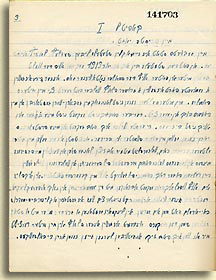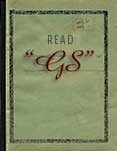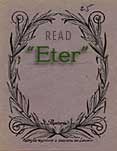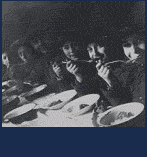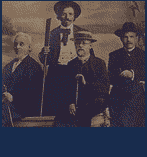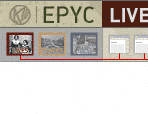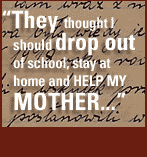

Because of my illness, I didn't start going to public school until I was eight years old. When the school year started after summer vacation, my father enrolled me in public school on Ostrowiecka Street.
To this day, the street where the school stands looks the same as it did years ago. Most of the people who live there are Christians. The school is a low, wooden building surrounded by gardens and trees. The air there is very healthy and pure.
Because of my illness I was a whole year behind for my age. I was both emotionally and physically too weak to take the entrance exam for the second grade. I had recently had diseases, such as the measles, which left me in a weakened condition, and then the lung ailment made things even worse. Although I was now attending school, I was still weak, and for the next three years I often suffered a relapse of my illness.
Now I'll get back to the school. The warm weather was soon over, and winter came. I dressed warmly and went to school every day throughout the winter with very few interruptions. Our teacher was a cheerful fellow, although he used to mumble. He used to teach all his classes in a sing-song, so we called him "the silent singer." He was a good man, very friendly, and his students would literally climb all over him.
I, however, was very quiet by nature, and for this reason the teacher liked me and had me sit on the bench closest to him. I did very well in school, as I'd already had some advance preparation, which made it easier. From my very first minute at school I showed great aptitude in painting and pasting--that is, arts and crafts. I put so much effort into everything I made that the teacher simply marveled at my work. I used to paint all sorts of birds and flowers and other things, too [...]
Winter passed and spring came. All around the school everything had turned green, and it looked so nice that it was simply a pleasure to go to school. For Constitution Day on 3 May, our teacher organized a choir of children in the upper grades, and they put on a very fine concert for the school. There were also some recitations, and at the end they performed a scene from a play. This was the first public performance I had ever seen, and I liked it very much.
The school year was at its end. There were eight days left to distribute exam papers and grades. There was a lot of commotion at school, and we weren't learning much because our teachers were busy with grading and writing reports. We played outside for hours at a time, happy because our two-month vacation was about to begin.
Report cards were handed out on 20 June. I got very good grades and ran home, happily looking forward to the vacation. At home, as always, I found my father working at his cobbler's bench and my mother preparing lunch. When I gave them the results of my first-grade report card--and especially when I told them that I had been promoted to the second grade--everyone in our house was happy. Even the younger children were happy, although they didn't really understand what was happening.
My father promised to have a new suit made for me, and he kept his word. In a few weeks he actually had suits made for me and my younger brother.
Then I went back to the TOZ summer camp for a month. We used to go at eight o'clock in the morning and stay until six in the evening. This enabled me to recuperate [...]
Middle-class and Poor Children
At school I came in contact with all kinds of children, both rich and poor. I could tell them apart by their appearance and dress. We used to study and play together; we spent time with each other and became friends.
In the lower grades the gap between rich and poor was very small. But as we got into the upper grades--say, fifth or sixth grade--there were fewer and fewer poor children. At the time, I looked at who my friends were and who attended school with me. At first I couldn't accept the idea that there was a divide between the working class and the middle class.

The children of wealthy families and even of the lower middle class were more friendly with the other "big shots" than with us. When I was in the fifth grade there was still a group of eight to ten children from working-class homes, but by the sixth grade there were only three of us left, because the rest got left back in the fifth grade. Only then did I see clearly the line that divided me and my two friends, Yudl and Moyshe, from our other classmates.
What were the factors that deepened this rift? Very simply, my friend Yudl and I didn't have textbooks, and it was hard for us to learn. We studied together; he had one book and I had another one, but we didn't have any of the other books we needed. We tried to borrow them from our classmates, but our requests fell on deaf ears.
Yudl's father was a bookbinder, and we both studied in his workshop. He was a class-conscious worker. As he worked he would explain to us why something was the way it was or why it was different, and Yudl and I would stand there and listen. We began to understand what separated us from them.
The school year was over, and we were both left back in the sixth grade. I wasn't surprised that this happened. I didn't register to repeat the sixth grade, because even repeating the year would have interfered in my pursuit of a trade. So that was the end of my public school education.
When I was in the fourth and fifth grades I began to have aspirations for my future. I knew that there was such a thing as gymnasium  , a more advanced school where you continued your studies, and that then you went to university and became an educated person--a doctor or a lawyer--and there were many other things to study as well.
, a more advanced school where you continued your studies, and that then you went to university and became an educated person--a doctor or a lawyer--and there were many other things to study as well.
It never occurred to me that I wouldn't study and realize my aspirations. My dream was so bright, so full of desire for something loftier, something grand and beautiful. In a word, I was filled with a great desire to become an educated person.
The turning point came unexpectedly. In the sixth grade I felt instinctively that this road was somehow closed for me. When I saw that I didn't always have enough money to buy a book or a notebook, I began to wonder why this was the case and what would happen in the future.
Gradually I became more resigned to my fate. Life's harsh realities put an end to my dream all at once. I was very upset when I finished the sixth grade with poor marks, even though I had been expecting this for a long time.
Now came the turning point in my young life. When I came home my father explained that I wouldn't be going to school any more and that I would start to learn a trade. I finally realized that higher education wasn't for me, that having to live on my father's income didn't afford me the possibility of going to school. I had to make peace with reality and abandon my dream.




